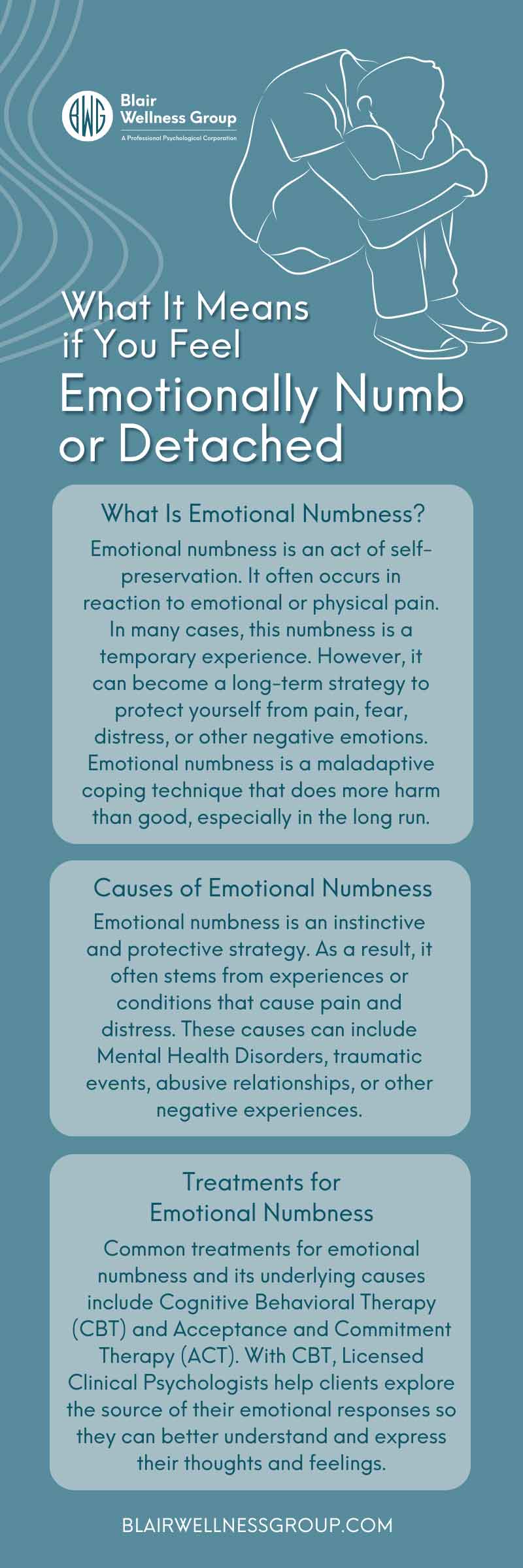When physical numbness occurs, it causes a loss of feeling in part of your body. The same thing can occur mentally. Emotional numbness is not always obvious, but it significantly impacts your thoughts, emotions, and overall well-being.
Learning the symptoms and causes of emotional numbness can help you identify the problem for what it is and seek professional help before the issue worsens. Explore what it means if you feel emotionally numb or detached and learn the ins and outs of this condition with this overview.
What Is Emotional Numbness?
Like physical numbness, emotional numbness refers to a lack of feeling. It is the process of shutting down thoughts and feelings. Emotional numbness can also cause you to stop expressing emotions. The result is a perpetually low or neutral mental state in which you experience neither pain nor pleasure.
Emotional numbness is an act of self-preservation. It often occurs in reaction to emotional or physical pain. In many cases, this numbness is a temporary experience. However, it can become a long-term strategy to protect yourself from pain, fear, distress, or other negative emotions. Emotional numbness is a maladaptive coping technique that does more harm than good, especially in the long run.
Symptoms and Indicators of Emotional Numbness
Identifying emotional numbness is not always easy. If you are experiencing numbness yourself, then thinking about the problem clearly and logically is difficult because your thoughts and emotions are in the process of shutting down. Even from an outside perspective, emotional numbness can look like exhaustion or a simple loss of interest instead of a maladaptive behavior.
However, there are a few indicators that someone is experiencing emotional numbness. These include:
- Feeling or coming across as distant or detached
- Losing interest in hobbies, relationships, and activities you previously enjoyed
- Feeling flat or dull
- Struggling to find motivation or meaning
- An inability to participate fully in life
- Struggling to convey your emotions
- Struggling to feel happiness or other positive emotions even in safe, happy settings
Avoidant behaviors are also common symptoms of emotional numbness. People who feel emotionally numb might intentionally or unintentionally avoid emotional confrontation, use denial as a defensive mechanism, or isolate themselves to avoid both positive and negative stimuli.
Causes of Emotional Numbness
Emotional numbness is an instinctive and protective strategy. As a result, it often stems from experiences or conditions that cause pain and distress. These causes can include Mental Health Disorders, traumatic events, abusive relationships, or other negative experiences.
Anxiety
Avoidant behaviors are a common symptom of anxiety. For example, someone with Social Anxiety Disorder might avoid big social events or running errands during busy times of the day. This same basic philosophy applies to anxiety and emotional numbness. Someone who experiences high levels of stress, worry, and uncertainty because of their anxiety might resort to numbness to avoid those feelings. Shutting out fear and dread is much easier than facing and living with those emotions.
Depression
Depression is another Mental Health Condition that commonly causes emotional numbness. You might experience emotional numbness as a way to escape the overwhelming grief, sadness, or guilt that comes with your depression. However, it is important to note that depression itself can dull your feelings and hinder emotional attunement. Furthermore, depression makes it more difficult to regulate mood, creating challenges in identifying and overcoming emotional numbness.
Borderline Personality Disorder
Borderline Personality Disorder, or BPD, is another Mental Health Disorder that heavily affects mood. Many people with BPD experience severe mood swings ranging from elation to deep sadness. These repetitive and overwhelming emotions can leave you feeling exhausted and drained. This makes emotional numbness seem like an appealing escape from the intense shifts in mood.
Post-Traumatic Stress Disorder
Trauma is one of the most common causes of emotional numbness. After a painful or frightening event, your mind might shut itself off from emotional stimuli to prevent further distress.
With Trauma Disorders such as Post-Traumatic Stress Disorder (PTSD), it is common for individuals to consciously or subconsciously avoid reminders of the traumatic event that is affecting them. In these cases, emotional numbness is another form of avoidance. People with PTSD might experience emotional numbness to avoid thoughts, feelings, conversations, relationships, or other scenarios that they might relate to the traumatic event.
Overwhelming Stress
If you experience high levels of stress—or if you do not have the healthy stress management skills to deal with stress—then you can easily feel overwhelmed. Elevated stress levels quickly lead to burnout, emotional and physical exhaustion, feelings of anxiety, and other negative emotional states. In these scenarios, detaching from your feelings offers a form of escape so that you do not have to face the source of your stress.
Grief
Dealing with grief is hard, and everyone faces it differently—including with emotional numbness. In fact, denial is one of the commonly referenced stages of grief that people must work through before they can accept loss. Because grief involves overwhelming feelings of sadness—as well as other associated feelings like anger or guilt—emotional disconnection is a common way to ease the pain of losing a loved one.
Abuse
Abuse, like trauma, can lead to emotional numbness as an act of self-preservation. This is true for physical abuse as well as mental or emotional abuse. It is also particularly common in individuals who experienced abuse as children. Childhood abuse increases the likelihood of emotional dysregulation, which in turn leads to emotional numbness.
Treatments for Emotional Numbness
Understanding what it means when you feel emotionally numb or detached is the first step to seeking professional help. A Licensed Clinical Psychologist can help you identify the source of emotional numbness and build better ways to deal with painful or negative feelings.
Common treatments for emotional numbness and its underlying causes include Cognitive Behavioral Therapy (CBT) and Acceptance and Commitment Therapy (ACT). With CBT, Licensed Clinical Psychologists help clients explore the source of their emotional responses so they can better understand and express their thoughts and feelings.
On the other hand, ACT takes a mindfulness-based approach that helps clients experience negative or painful emotions without suppressing or withdrawing from them. Both of these treatments help improve emotional resilience and regulation, allowing patients to face hardship and pain without shutting down.
Emotional numbness creates challenges and hardship in relationships, professional goals, and personal wellness. By working with an experienced trauma psychologist, you can work through numbness, build emotional resilience, and improve your overall quality of life.















